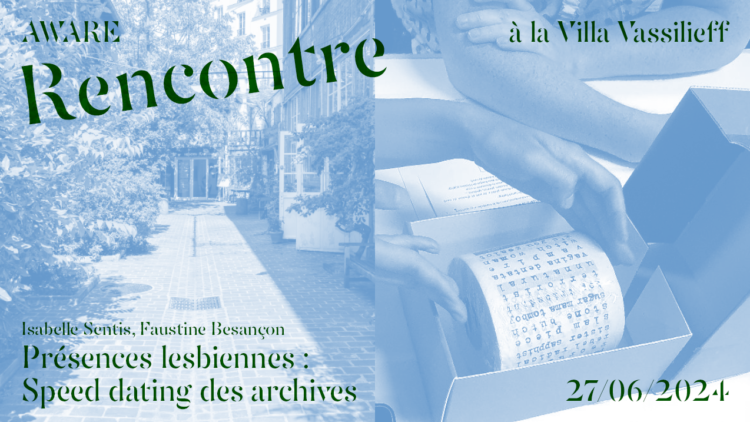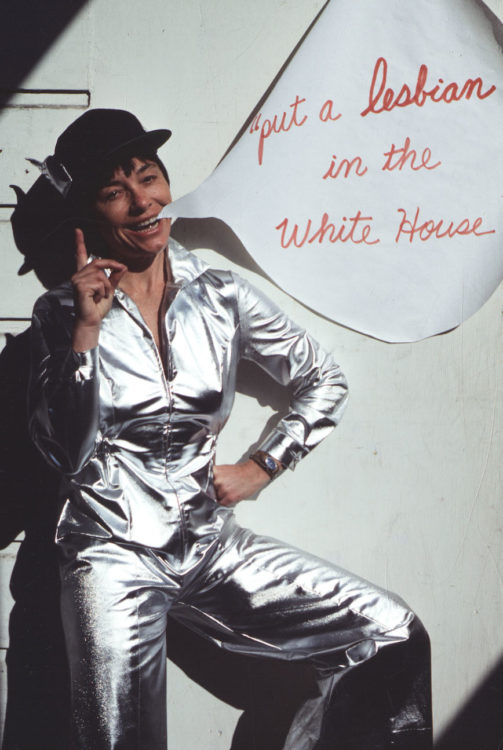Round-table
From left to right: Chemin du Montparnasse, © Margot Montigny/AWARE; Donna Gottschalk, Sleepers, Limerick, Pennsylvania, 1970, silver gelatin print, Courtesy of the artist; Design by Lisa Sturacci studio, © AWARE: Archives of Women Artists, Research & Exhibitions
21, avenue du Maine
75015 Paris
Montparnasse – Bienvenüe metro station, Exit 2, Lines 4, 6, 12 and 13
Villa Vassilieff is accessible to visitors using wheeled devices or who have mobility difficulties thanks to special facilities (access ramp, adapted toilets, and a lift).
In addition, several reserved parking spaces are available close to the Villa Vassilieff:
• in front of 4 rue d’Alençon, 75015 Paris
• in front of 7 rue Antoine Bourdelle, 75015 Paris
• in front of 23 rue de l’Arrivée, 75015 Paris
Consult the map of adapted parking spaces in Paris here.
The traces of lesbian and queer artistic life are numerous, at least since the 19th and 20th centuries. However, these narratives remain on the margins of conventional art history, often rendered invisible within the very biographies of the artists, forcing history to adopt a narrow perspective. AWARE proposes a series of events focusing on Lesbian and Queer Presences in the history of 19th- and 20th-century art.
Many of these artists lived their identities to the fullest, allowing these identities to influence their work. Figures such as Rosa Bonheur, Lotte Laserstein, Romaine Brooks, Marie Laurencin, Gerda Wegener and Lili Elbe, Marlow Moss, Claude Cahun and Marcel Moore, or more recently Barbara Hammer and Laura Aguilar, to name just a few, have significantly shaped contemporary lesbian and queer art history and culture. Questioning lesbian visibility and presence means embracing the complexity and reality of the histories, creations, and cultural legacies of these artists.
The history of photography, like the history of art, is traditionally written according to canonical rules, emphasizing the author’s significance and aiming to individualize each creator’s unique gesture. Yet photographic practice sometimes transcends these conventions, blurring boundaries and offering new possibilities: we photograph ourselves not only to project an image of who we are, but also to reflect our communities We hand our camera to others, or incorporate archival images in essence, we use the possibilities of photography to tell different stories.
This discussion, organized in collaboration with writer and photography historian, Hélène Giannecchini, will open an exchange ideas on community as a generative space and source of invention through image-making, with a focus on contemporary photographic practices. The conversation will feature Marie Docher, photographer and filmmaker, Aurélie Journée-Duez, anthropologist and art historian, artist-researcher, Félixe Kazi-Tani, and photographer Nanténé Traoré. The discussion will be moderated by Hélène Giannecchini, accompanied by Ana Bordenave.
Together, these voices will explore varied approaches to images and photography, from a queer perspective.
This series of events is conceived by Ana Bordenave, with the assistance of Naemi Piecuch.
Practical information
Tuesday, November 12, 2024, from 6:00 pm
The event will be held in French.
Free registration here.
Villa Vassilieff
Villa Vassilieff
Screening of The Female Closet (1998, 57min) by Barbara Hammer
Villa Vassilieff
Villa Vassilieff
Marie Docher : Marie Docher is a photographer, filmmaker, activist, and a member of the collective La Part des Femmes, which is committed to promoting equality and diversity in photography. Winner of the 2022 Grande Commande Photographique from the Ministry of Culture/BnF, she created the series Et l’amour aussi…: 40 portraits of women and interviews, 10 years after the passing of the “mariage pour tous “(marriage for all) law. She is a Chevaleresse of the Order of Arts and Letters.
Hélène Giannecchini is a writer, art theorist, and curator. She holds a PhD in literature, specializing in the relationship between text and image, and is a member of CRAL (EHESS/CNRS). She is the director of the Alix Cléo Roubaud Fund, dedicated to the photographer and writer who passed away in 1983, and has focused her early research on Roubaud, including an exhibition at the Bibliothèque Nationale de France (2014) and her doctoral thesis (2016). Giannecchini has published several books with Éditions du Seuil, in the “La Librairie du XXIe siècle” series, including Une image peut-être vraie (2014), Voir de ses propres yeux (2020), and Un désir démesuré d’amitié (2024). She was a resident at the Villa Medici in 2018-19 and at the Villa Albertine in 2021.
Her current research, begun during a residency at the Centre National de la Danse in Pantin, focuses on the archives of LGBTQIA+ everyday life in the second half of the 20th century. This work has already led her to curate the exhibition Donna Gottschalk: “Ce qui fait une vie”, dedicated to the lesbian photographer Donna Gottschalk, at the Marcelle Alix Gallery in April 2023, and to write the booklet for Cortèges, a piece performed at the Philharmonie in 2023. As the recipient of the Lewis Baltz Research Fund for 2023-24, she continues her research on the photographer Donna Gottschalk between the United States and France and is preparing an exhibition of the artist’s work, which will open at Le Bal in Paris in June 2025.
Aurélie Journée-Duez holds a PhD in anthropology and art history from EHESS and Panthéon-Sorbonne. Her dissertation examines the role of photography in the creative practices of Indigenous women and queer artists in the United States and Canada, from the 1970s to the present day. The thesis will soon be published by Presses Universitaires du Septentrion. Her research is grounded in an intersectional and decolonial approach. She also previously served as president of the Comité de Solidarité avec les Indiens des Amériques (CSIA-Nitassinan), an organization founded in 1978. Currently, she is a professor of visual arts.
Félixe Kazi-Tani is an alumnus of the Post-Diploma in Fine Arts at Lyon and is currently a doctoral student at Villa Arson (supervised by Samir Boumediene and Joan Ayrton). Their current research is a queer and iconographic critical inquiry into the bourgeois politics of European table cultures. Their artistic practice involves the continuous montage of images and texts, aiming to disrupt what unconsciously normalizes us and to reveal an often-overlooked aspect of our queer history: the everyday and the domestic.
Previously, they worked as a teacher and designer-researcher at ENSAD Paris, Cité du Design, ESADSE, and CoDesign Lab Télécom ParisTech. Félixe Kazi-Tani has also contributed to curating the 2017 International Design Biennale and the French Pavilion at the 2019 Milan Triennale. By observing minor or marginalized approaches to design (queer, trans, and those that challenge normative boundaries), their research has led them to engage with transfeminist, anti-capitalist, and ecological activists. They are a founding member of the graphic research collective Bye Bye Binary, which explores inclusive, queer, and post-binary typographic forms. Their work has been presented at various venues, including the Sandretto Re Rebaudengo Foundation, the Musée d’Art Contemporain in Lyon, the Marcelle Alix Gallery, the Centre Georges Pompidou, and the Aubervilliers Laboratories.
Nanténé Traoré is a photographer and author who graduated with a DNA from ESBANM in 2016 and currently works between Brussels and Paris. Nanténé Traoré tells stories through both words and images. In his photographs and texts, the same motifs emerge—narratives of tenderness, transmission, and freedom, conveyed by moving bodies that are de-normalized and ephemeral. Through this process of repetition, both in technique and in the creative protocol of his textual and visual works, the artist crafts a 360-degree universe where a succession of haunting images, gestures, and endlessly repeated words contribute to an ongoing quest for authenticity—ultimately seeking to approach the critical point of individual narratives, where one person’s story transforms into a universal narrative. He is represented by the Sultana Gallery in Paris and has published works with Hachette, Gorge Bleue, and Points. His work has garnered several awards in contemporary art and photography across France, Austria, and Germany (including the Prix Découverte at the Rencontres d’Arles, Prix Mentor, Prix Vonovia, Prix Utopie, and Prix Wortimbild), and has been featured in numerous solo and group exhibitions throughout France and Europe since 2020.









